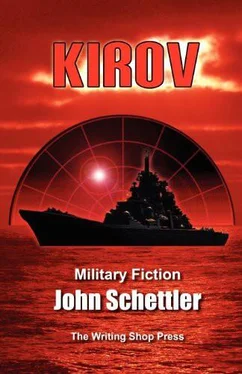John Schettler - Kirov
Здесь есть возможность читать онлайн «John Schettler - Kirov» весь текст электронной книги совершенно бесплатно (целиком полную версию без сокращений). В некоторых случаях можно слушать аудио, скачать через торрент в формате fb2 и присутствует краткое содержание. Жанр: Фантастика и фэнтези, Альтернативная история, на английском языке. Описание произведения, (предисловие) а так же отзывы посетителей доступны на портале библиотеки ЛибКат.
- Название:Kirov
- Автор:
- Жанр:
- Год:неизвестен
- ISBN:нет данных
- Рейтинг книги:5 / 5. Голосов: 1
-
Избранное:Добавить в избранное
- Отзывы:
-
Ваша оценка:
- 100
- 1
- 2
- 3
- 4
- 5
Kirov: краткое содержание, описание и аннотация
Предлагаем к чтению аннотацию, описание, краткое содержание или предисловие (зависит от того, что написал сам автор книги «Kirov»). Если вы не нашли необходимую информацию о книге — напишите в комментариях, мы постараемся отыскать её.
Kirov — читать онлайн бесплатно полную книгу (весь текст) целиком
Ниже представлен текст книги, разбитый по страницам. Система сохранения места последней прочитанной страницы, позволяет с удобством читать онлайн бесплатно книгу «Kirov», без необходимости каждый раз заново искать на чём Вы остановились. Поставьте закладку, и сможете в любой момент перейти на страницу, на которой закончили чтение.
Интервал:
Закладка:
Kirov was still steaming slowly south by southwest at 10 knots, her sensors keenly scanning the surrounding ocean and airspace for any sign of an enemy of vessel or plane. They seemed to have perfect clarity, but only out to a range of about 30 kilometers, and Rodenko noted that radius slowly increasing. Tasarov’s sonar was clearing up as well, but he still had no contact on the Orel.
Admiral Volsky had been trying to decide whether to continue the investigation or return to Severomorsk. He considered what Karpov had been arguing, that this was indeed a surprise attack by Western forces upon his nation. Both Slava and Orel were suddenly missing and, seen in that light, the explosion Kirov had experienced might have been a near miss attempt to destroy her as well. The fact that Severomorsk did not respond on normal naval message frequencies could mean many things. The base could be observing radio silence, or they could have sustained damage preventing communications. Then again, the base could have been destroyed as well. It was homeport of the Russian North Seas fleet, surely a tempting and vital target in any first strike scenario.
Volsky called down to engineering for a status update on the reactors, pleased to learn that the system readings were now normal again.
“It sounded a bit odd there for a while,” said Chief Dobrynin.
“It sounded odd? What do you mean?”
“I’m not sure, sir. It’s just…Well I’ve been around this equipment most of my career in the service, and you come to know a thing by how it sounds. The harmonics were odd-that’s all I can say. It didn’t sound right to me, but the readings are normal, sir. There is nothing to be concerned about.”
“Very Well, Chief. Carry on, and report immediately if you hear anything else that disturbs you. Anything at all, yes?” The Admiral knew exactly what the Chief was trying to tell him. Years on ships at sea gave some men an uncanny sense that could detect the slightest abnormality in the ship-the way it sounded, or moved in the sea. Volsky settled into his chair, musing as he listened himself, thinking he might hear an answer to their dilemma in the faint hum of the ship’s consoles, or the thrum of the turbines.
Karpov lingered near Nikolin’s communications station for some time, as if he was waiting for a coded signal message to return from Severomorsk at any moment. Yet the time stretched out, and Nikolin waited with him, seeming edgy and somewhat discomfited by the Captain’s close presence. Karpov had a way of hovering over a workstation, and asking entirely too many questions. He was tense and uneasy as well. Somehow the sense of isolation in the long silence left him feeling strangely adrift.
Severomorsk was not merely home, but also the rein of ultimate control on the ship. Orders might come from home port that could supersede those of Admiral Volsky himself. Volsky was Admiral of the Northern Fleet, but above him was Commander-in-Chief of the Navy itself, Gennady Alexandrovich Suchkov, and his Deputy Chief of Staff Vladimir Ivanovich Rogatin. Karpov had been slowly building relationships with these men, hoping they might be useful one day. Vlasky had succeeded Suchkov as Admiral of the Northern Fleet, and Rogatin had been a former Captain of the old battlecruiser Kirov before he moved on to higher ranks. Vlasky was also the most likely candidate to take the aging Suchkov’s place, so Karpov found himself well positioned to advance even further if recent history was any guide.
Now the strange silence from Severomorsk was most discomfiting to him. A favorite tactic against a man of senior rank had always been an appeal to higher authority. Karpov had ingratiated himself with the Naval Staff as he wheedled his way into the command chair of the Kirov. Volsky was his senior, and by a wide margin, but he could always appeal to Severomorsk for a countervailing decision. So his first order of business was to seed the matter there with his own opinion as soon as he possibly could. He wanted to see if he could color the matter at hand in the eyes of senior officers back home, and possibly influence any decision that they might make about the situation. Yet more than this, he wanted to make certain his own actions would be viewed in a proper light; he wanted to begin, even in official discourse, the line of subtle truth-bending that was vranyo. The Admiral had countermanded his orders just now, and Karpov still burned with a quiet inner resentment over that. He did what he believed was proper, and in his mind the Admiral was remiss.
On one level, he saw a glimmering of opportunity in this situation. Orel and Slava were both missing, and the Admiral was being far too lax in his assessment of the potential dangers here. This incident would be viewed harshly back home, and blame and scapegoating were sure to follow. The Admiral was responsible, he knew, but he would make sure that any fault found rested squarely on Volsky’s shoulders. He would let Severomorsk know exactly what he thought, and somewhere in his mind he was already launching missiles at the Admiral. The struggle for the first salvo was the essence of modern naval combat. The Captain wanted to be sure he had himself in the best possible position if it came to an inquiry on these events. A report would have to be written on the matter, and he was already hard at work, drafting copy in his mind, and thinking just who best to put on the distribution list.
Yet for now, it was the silence that bothered him most. Who could he tell his stories to, his half-truths and darker lies, if no one was listening back home? What was going on? Why didn’t Severomorsk answer? He badgered Nikolin about his equipment-was it working correctly? When was the last time it was given a full maintenance check? Who had the duty here on the last watch? Was he trying the secure Satellite com-link line?
“I have no satellite link, sir,” Nikolin explained. “I cannot establish links to any of our com-sat bands. It must be the interference, sir.”
Karpov was wagging an accusatory finger at Nikolin, and frowning. “Keep trying, Mister Nikolin. I expect you to get this equipment sorted out!” Then he saw Nikolin had an iPod sitting off to one side, and he snatched it up, shaking it in the young Lieutenant’ face. “Perhaps you should spend more time focused on your duties, Nikolin, and less with this.” He took the device and strode away, like a strict school master chastening a wayward student.
Nikolin, shrugged, deflated, harried, and trying harder than ever to get through to Severomorsk. He sighed with relief when the Captain finally wandered off, looking for Chief Orlov, though he hoped Karpov would not pass the matter on to the him.
Orlov was a strong man, iron willed, and often too much of a disciplinarian when it came to running the ship’s schedules and training exercises, meting out swift punishment to any crewman who was lax in his duties. He was Karpov’s hard whip when it came to discipline and firm handling of procedures on the ship. The Chief was actually a Captain of the 3rd Rank, two rungs below Karpov, but stood as “Chief of Operations” and was therefore simply called the “Chief” by the men.
He had fifteen years in the navy, most served by default because he never had the babki to do anything else, or so he claimed. The truth was, he was sent here after a stint in prison when running with the criminal element known as the blatonoy, the purveyors of blat in its most extreme forms. A man needed a little dough in life, the money to grease a few palms or open a few doors, like the small dough cakes called babki the Russians delighted on and gifted one another with at times. Orlov never made his big deal with the blatnoy, so he found himself in the navy, and then found that he enjoyed the rigors of the service, and his position of authority there was better than any life he could find ashore.
Читать дальшеИнтервал:
Закладка:
Похожие книги на «Kirov»
Представляем Вашему вниманию похожие книги на «Kirov» списком для выбора. Мы отобрали схожую по названию и смыслу литературу в надежде предоставить читателям больше вариантов отыскать новые, интересные, ещё непрочитанные произведения.
Обсуждение, отзывы о книге «Kirov» и просто собственные мнения читателей. Оставьте ваши комментарии, напишите, что Вы думаете о произведении, его смысле или главных героях. Укажите что конкретно понравилось, а что нет, и почему Вы так считаете.












